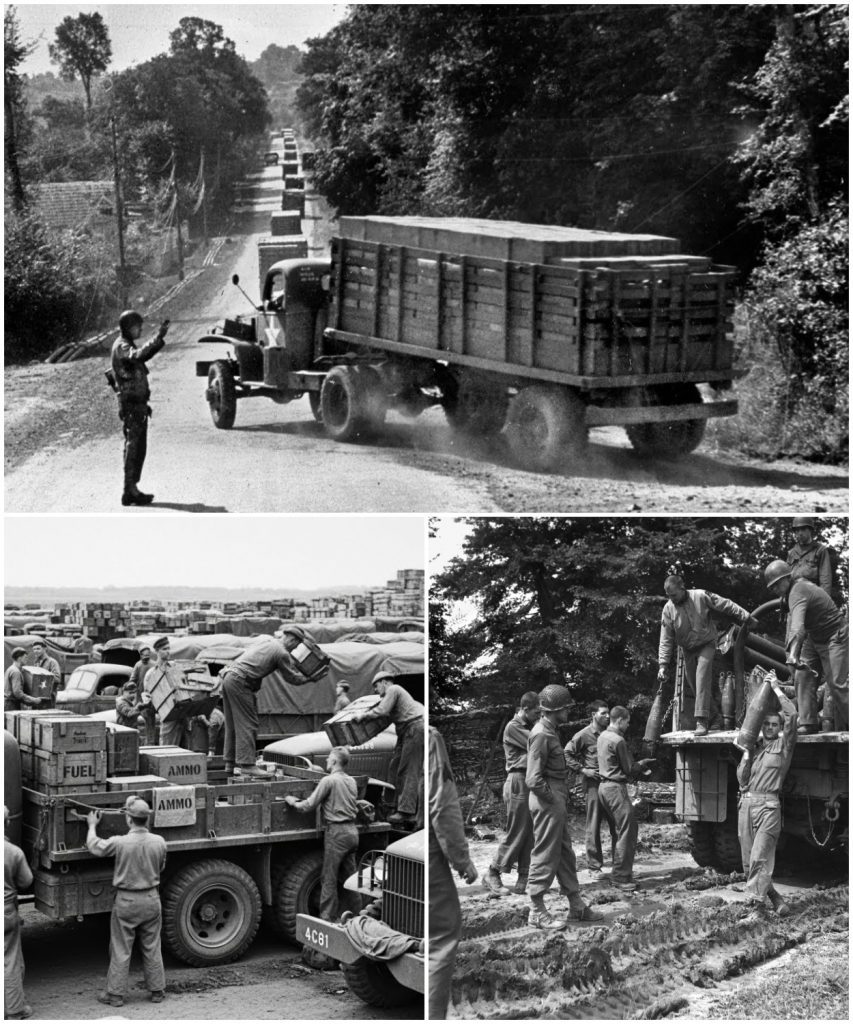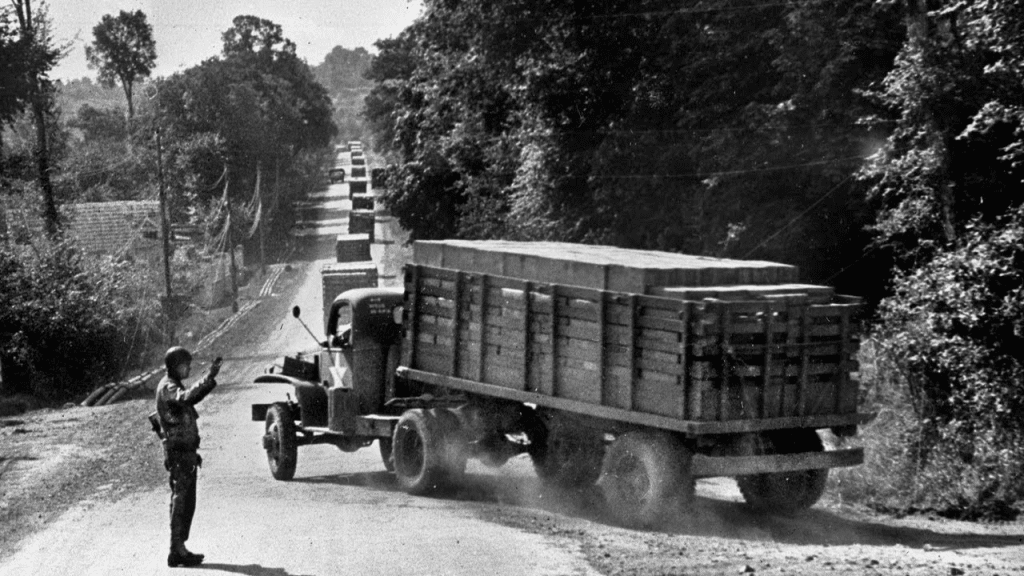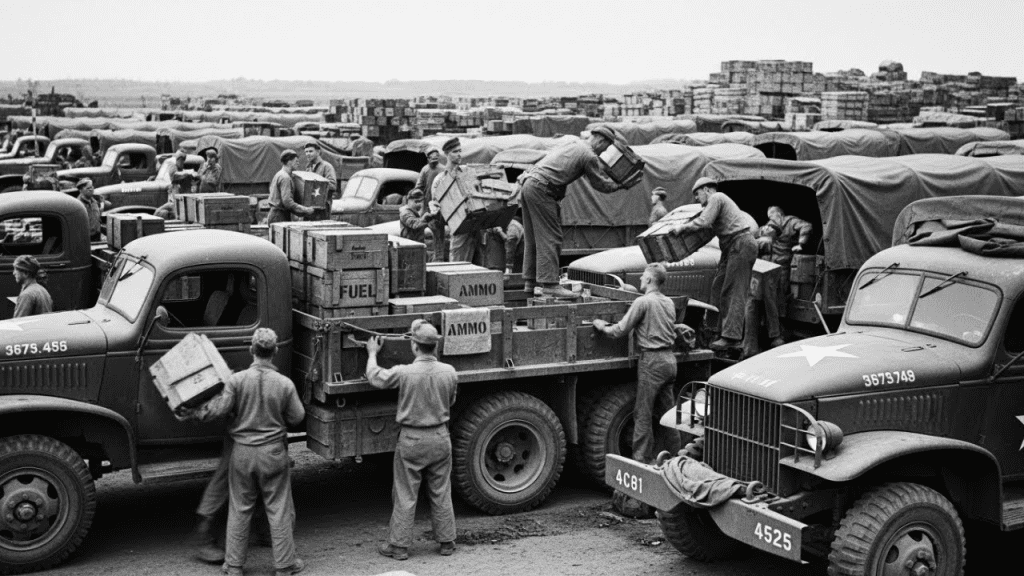The Red Ball Express: How Unsung Heroes Changed the Course of World War II
In the history of World War II, battlefield heroics often steal the spotlight, but behind every victory lies a web of unseen efforts. One of the most remarkable yet overlooked chapters involves the Red Ball Express—a logistical operation that kept General George S. Patton’s forces supplied during their rapid advance across France. Driven largely by African American soldiers, this convoy system defied expectations, shattered stereotypes, and demonstrated the crucial role of logistics in modern warfare.

The Birth of the Red Ball Express
The Red Ball Express was launched in August 1944, shortly after the Allied forces had successfully invaded Normandy. As American troops pushed further into French territory, maintaining a steady supply line became vital. Troops needed food, ammunition, fuel, and medical supplies to sustain their momentum. Without these essentials, even Patton’s legendary speed could falter.
What made the Red Ball Express unique was its design: dedicated one-way routes for continuous delivery. Trucks operated around the clock, maximizing efficiency. At the core of this system were the predominantly African American truck drivers, many serving in segregated units. Despite facing racial discrimination and challenging conditions, they transported up to 12,500 tons of supplies daily, proving their skill and resilience.
Video : German Generals Laughed At U.S. Logistics, Until The Red Ball Express Fueled Patton’s Blitz
A Logistics Miracle on Wheels
The scale of the Red Ball Express was staggering. Nearly 6,000 trucks ran continuously over 400 miles of rough and sometimes sabotaged terrain. In just 82 days, the operation delivered over 412,000 tons of supplies, achieving more than 122 million ton-miles. Even with a daily vehicle failure rate of 30%, the system never faltered, thanks to the mechanics and drivers who kept the convoys moving.
The impact of the Red Ball Express extended beyond raw numbers. The constant roar of trucks along the French countryside created a psychological advantage, unnerving German forces and reinforcing the reality of the American industrial and logistical machine. German generals, who initially scoffed at U.S. supply capabilities, soon realized that the Allies’ sustained mobility was unstoppable.
Breaking Racial Barriers Through Service
Beyond logistics, the Red Ball Express became a catalyst for social change. African American soldiers operating the convoys demonstrated exceptional courage, skill, and endurance under pressure. They faced systemic racism, inadequate training, and dangerous conditions, yet they consistently delivered results.

Their success challenged prevailing stereotypes within the U.S. military and society at large. These drivers showcased that competence and dedication were not bound by race. Their performance laid the groundwork for the eventual integration of the U.S. armed forces and contributed to the momentum of the civil rights movement in the decades that followed.
The German Miscalculation
Early in the campaign, German commanders underestimated the American logistical system. They assumed that the Red Ball Express would collapse under the strain of extended supply lines and challenging road conditions. The relentless supply of fuel, food, and ammunition, however, kept Patton’s forces operational and mobile, allowing them to exploit gaps in German defenses.
This logistical superiority enabled Patton to maintain unprecedented speed in his advance, often outpacing enemy expectations and disrupting their strategic planning. The success of the Red Ball Express forced German forces to reassess their own capabilities and highlighted the decisive role of logistics in modern warfare.
Video : German Generals Laughed At U.S. Logistics, Until The Red Ball Express Fueled Patton’s Blitz
The Human Stories Behind the Convoys
The Red Ball Express was more than trucks and ton-miles; it was about the men who risked their lives every day. Many drivers endured long hours, poor weather, and the constant threat of enemy attack. Yet, their determination never wavered. Communities along the routes often witnessed the convoys’ persistence, and some civilians joined in support, offering water or encouragement to the exhausted drivers.
These human stories are as compelling as the statistics. The drivers’ commitment to their mission, despite systemic barriers and personal hardships, epitomized courage and resilience. Their achievements provided a powerful example of how dedication and skill could triumph over adversity, both on and off the battlefield.
Legacy of the Red Ball Express
The Red Ball Express left an indelible mark on military history. It demonstrated how efficient supply chains could directly influence the outcome of campaigns. Moreover, it redefined perceptions of African American soldiers in combat support roles, challenging prejudices and fostering respect within the military hierarchy.
The operation’s success inspired future military logistics planning and remains a case study in efficiency, problem-solving, and leadership under pressure. It also serves as a testament to the unsung heroes whose contributions, while not always celebrated in headlines, were crucial to the Allies’ victory in Europe.

Honoring the Unsung Heroes
Remembering the Red Ball Express is about more than numbers and routes—it’s about recognizing courage, determination, and innovation. These truck drivers ensured that Patton’s forces could advance at breathtaking speed, often under conditions that would have stymied lesser efforts. Their story reminds us that victories are not just won on the front lines; they are made possible by those working tirelessly behind the scenes.
In the broader context, the Red Ball Express symbolizes the triumph of ingenuity and perseverance over skepticism and prejudice. It’s a story of innovation in the face of adversity, of individuals rising above systemic obstacles, and of a military force transformed by the dedication of unsung heroes.
Conclusion: The Power of Logistics and Loyalty
The Red Ball Express reshaped the course of World War II, proving that logistics can be as decisive as battlefield strategy. The African American truck drivers who powered this operation not only sustained Patton’s blitz across France but also challenged societal norms and helped redefine the role of Black soldiers in the U.S. military.
Their legacy is a testament to resilience, intelligence, and courage. In honoring the Red Ball Express, we celebrate not just the machinery of war but the human spirit that made it all possible—the unsung heroes who drove history forward, one mile at a time.